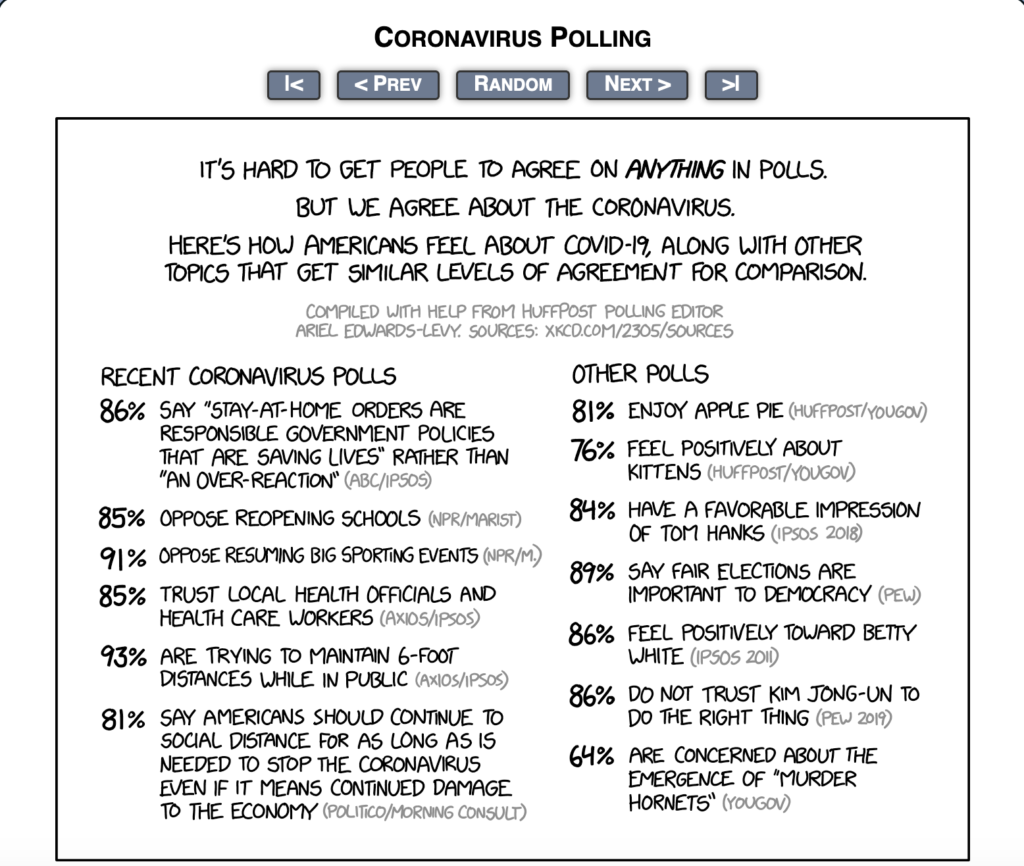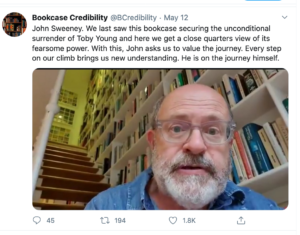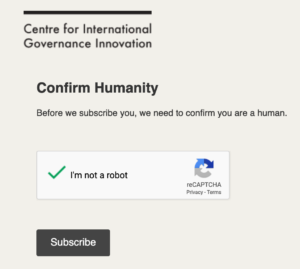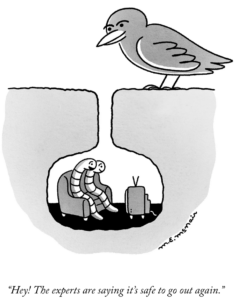Food deliveries continue during the pandemic
From our kitchen window, this morning.
Contrary to what you might think from watching Fox News, most Americans are sane
HT to Ed Murphy for the link.
A foreign perspective on the UK’s handling of the pandemic
Sometimes, when one is caught up in everyday events, it’s useful to find out how the UK looks to interested outsiders.
The New York Times‘s The Daily podcast had a really useful episode on this the other day. I liked it, of course, because it analysed Boris Johnson’s behaviour in the same way that I have, but still…
I’m still amazed (and infuriated) by the cunning he displayed having escaped with his life — to wrap himself in the NHS flag.
The podcast is really worth listening to.
And why is nobody talking about the European country — Greece — that has handled this crisis best?
Books really do furnish a Zoom
My riff in Quarantine Diary on Tuesday’s blog was partly inspired by an interesting new Twitter account which specialises in the semiotics of people’s bookcases in the background of their Zoom appearances. Its motto is “What you say is not as important as the bookcase behind you.”
Here’s an example of one of the tweets — in this case featuring John Sweeney, the celebrated roughhousing investigative journalist.
Lovely idea: smart and witty. And perceptive, sometimes.
John Gray and the resumption of history
John Gray has a knack of making one see current events from novel perspectives. He’s been writing consistently interesting stuff about the significance and likely impact of the Coronovirus, and this new essay in Unherd is no exception. He doesn’t think much of the prevailing idea that life after the virus will be much as before, only a bit worse. “When you read diaries of people who lived through the revolution in Russia”, he writes,
you find them looking on in disbelief as the vast, centuries-old empire of the Romanovs melted into nothing in a matter of months. Few then accepted that the world they knew had gone forever. Even so, they were haunted by the suspicion that it would not return. Many had a similar experience in continental Europe when the Great War destroyed what Stefan Zweig, in his elegiac memoir The World of Yesterday (1941), called “the world of security”.
As for now,
Much in the way we lived before the virus is already irretrievable. Probably a vaccine will be developed along with treatments that reduce the virus’ lethality. But this will likely take years, and in the meantime our lives will have altered beyond recognition. Even when it arrives, a deus ex machina will not dispel popular dread of another wave of infections or a new virus. More than government-enforced policies, public attitudes will prevent any reversion to pre-Covid ways.
The relevant comparison, he thinks, is not with previous pandemics such as the Spanish Flu, but instead the more recent impact of terrorism.
The numbers killed in terrorist incidents may be small. But the threat is endemic, and the texture of everyday life has altered profoundly. Video cameras and security procedures in public places have become part of the way we live.
Covid-19 may not be an exceptionally lethal pathogen, but it is fearful enough. Soon temperature checks will be ubiquitous and surveillance via mobile phones omnipresent. Social distancing, in one form or another, will be entrenched everywhere beyond the home. The impact on the economy will be immeasurable. Enterprises that adapt quickly will thrive, but sectors that relied on pre-Covid lifestyles — pubs, restaurants, sporting events, discos and airline travel, for example — will shrink or disappear. The old life of carefree human intermingling will fast slip from memory.
That echoes what I used to think every time I flew after 9/11 — standing in long queues at airports, having to take out laptops and remove jackets, shoes and belts, put liquids into transparent plastic bags — the whole paraphenalia of what Bruce Schneier calls ‘security theatre’. And all because a smallish group of fanatics hijacked four planes and changed the world.
This time the relevant agent, though, is a spherical virus less than a micron in diameter.
Great essay; worth reading in full.
Quarantine diary — Day 55
This blog is also available as a daily email. If you think this might suit you better, why not subscribe? One email a day, delivered to your inbox at 7am UK time. It’s free and there’s a one-click unsubscribe link if you decide that your inbox is full enough already!















